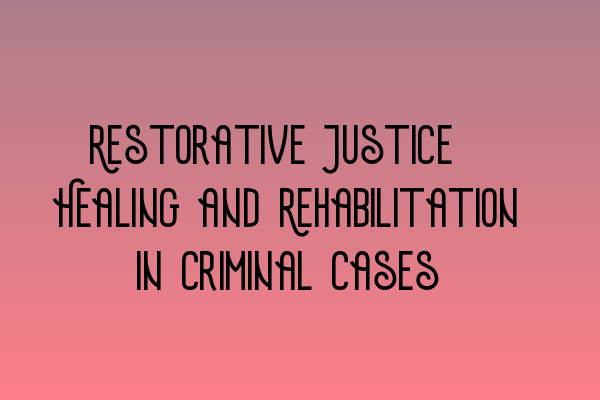Restorative Justice: Healing and Rehabilitation in Criminal Cases
In the criminal justice system, the focus has traditionally been on punishment. However, there is a growing recognition that punitive measures alone may not be the most effective way to address crime. Restorative justice offers an alternative approach that focuses on healing and rehabilitation for both victims and offenders. This blog post will explore the concept of restorative justice and its benefits in criminal cases.
What is Restorative Justice?
Restorative justice is a process that involves bringing together the victim, offender, and community to address the harm caused by a crime. It aims to hold the offender accountable while also providing an opportunity for healing and reconciliation. The key principles of restorative justice include:
- Encouraging Responsibility: Restorative justice emphasizes the importance of the offender taking responsibility for their actions and making amends.
- Victim Empowerment: Restorative justice seeks to empower the victim by giving them a voice in the process and providing an opportunity to express their needs and concerns.
- Community Involvement: Restorative justice recognizes that the community has a stake in the resolution of crimes and involves them in the process.
- Rehabilitation: Restorative justice aims to facilitate the rehabilitation of the offender, helping them address the root causes of their behavior and reintegrate into society.
By focusing on healing and rehabilitation, restorative justice offers a more holistic approach to crime that takes into account the needs of both victims and offenders.
The Benefits of Restorative Justice
Restorative justice has several benefits that make it a valuable alternative to traditional punitive measures. These include:
- Victim Satisfaction: Restorative justice allows victims to be directly involved in the resolution process, giving them a sense of empowerment and satisfaction.
- Offender Accountability: By requiring offenders to face the consequences of their actions and take responsibility, restorative justice promotes accountability and can help prevent future reoffending.
- Healing and Closure: Restorative justice provides victims with an opportunity to have their voices heard, express their emotions, and find closure, which can contribute to their healing process.
- Community Engagement: Involving the community in the resolution process fosters a sense of collective responsibility and can help rebuild trust and social cohesion.
- Rehabilitation: By addressing the underlying causes of criminal behavior, restorative justice supports the rehabilitation and reintegration of offenders, ultimately reducing the likelihood of future offending.
Restorative justice is increasingly being embraced as a valuable tool in the criminal justice system, as it offers a more forward-thinking and compassionate approach to addressing crime.
Implementing Restorative Justice
Implementing restorative justice requires collaboration between various stakeholders, including legal professionals, community organizations, and policymakers. By integrating restorative justice principles into the criminal justice system, we can ensure that healing and rehabilitation are prioritized alongside punishment.
At SQE Criminal Law & Practice Law UK, we recognize the importance of promoting alternative approaches, such as restorative justice, in the legal profession. Our SQE 1 and SQE 2 preparation courses cover a wide range of topics and provide comprehensive training for aspiring solicitors. If you are preparing for the SQE exams, consider taking advantage of our SQE 1 Practice Exam Questions and SQE 1 Practice Mocks FLK1 FLK2 to enhance your preparation. Additionally, our SQE 2 Preparation Courses and SQE 1 Preparation Courses can help you build a strong foundation in criminal law and practice.
Stay updated with the latest SRA SQE exam dates by visiting our website: SRA SQE Exam Dates.
By embracing restorative justice principles and ensuring access to justice for all, we can work towards a more compassionate and effective criminal justice system.
